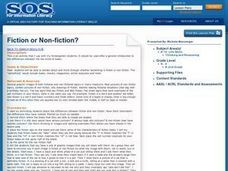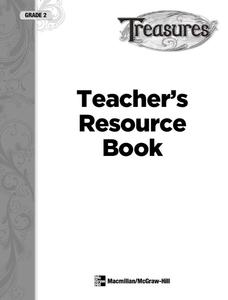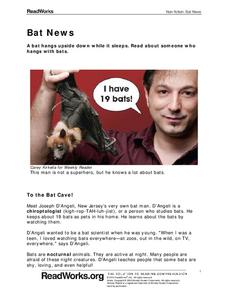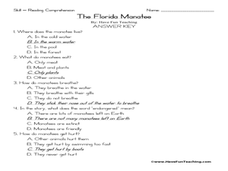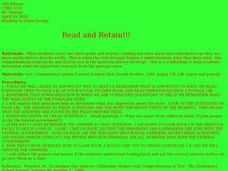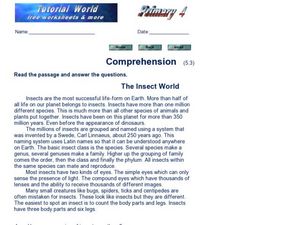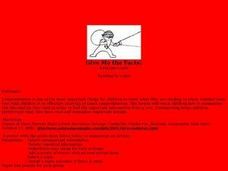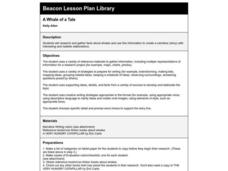Curated OER
Reading Comprehension: Fiction and Nonfiction
This resource is made up of a series of reading passages with accompanying questions. On the first page, learners read the definitions of both fiction and non-fiction. They examine four short selections before writing either fiction or...
Curated OER
Fiction or Non-fiction
Third graders view three texts, A DAY IN THE LIFE OF A FOOTBALLER, THE HUMAN BODY, AND WHICH IS WHICH? with the titles covered. They discuss whether the books are non-fiction or fiction and try to come up with suitable titles for the books.
Curated OER
Let's Get it Together! Reading to Learn
Let’s learn about frogs! Young readers are led through “Freaky Frogs,” a non-fiction article. Teach learners how to edit an article so there are fewer details to sift through. After talking through the article, they learn the six steps...
Polk Bros Foundation
How to Summarize a Non-Fiction Passage
After reading a text, one way to find out how much your class comprehended is to ask your pupils to summarize. This worksheet helps class members prepare for writing a summary of a nonfiction text. They note down the topic, up to eight...
US Department of Agriculture
George Washington Carver Coloring and Activity Book
Learn about the interesting life of George Washington Carver and his many accomplishments with this series of worksheets for primary grade learners. From coloring pages and word searches, to non-fiction reading passages and math skills...
Curated OER
Non-Fiction Reading and Writing
In this non-fiction text worksheet, students read the passage about spring flowers. Students then underline the sentences about Daffodils and Primroses.
Learning Station
Scan It
In this reading strategies worksheet, students will learn how to scan for information. Then students will scan a non-fiction passage about weather and complete 4 short answer questions.
Syracuse City School District
Summary of Fiction and Non-Fiction Text
Somebody Wanted But So Then (SWBST)? Yes! Here's a great strategy for teaching young readers how to summarize narrative text. In addition, the packet includes exercises that show kids how to summarize nonfiction text using the classic...
Polk Bros Foundation
Preview Reading
Scanning a text before getting started is a reading strategy that your pupils can use to get a general idea about a text before diving in. Give some direction to their scanning with a worksheet that includes items to check for and space...
McGraw Hill
Phonics Teachers Resource Book
Looking to improve your classes literacy program? Then look no further. This comprehensive collection of resources includes worksheets and activities covering everything from r-controlled vowels and consonant digraphs, to the...
Read Works
Bat News
Get the bat facts with a short nonfiction reading passage. After reading the passage, readers respond to questions that focus on main idea, inferencing, vocabulary in context, and author's purpose.
Curated OER
The Florida Manatee: Reading Comprehension
Five multiple choice questions test early readers on their understanding of a one-page passage on the Florida Manatee. Answers on page 3.
Curated OER
Summarize This!
Students explore how to summarize a reading passage. They read non-fiction books. Students use a Venn Diagram to compare and contrast the two animals they read about. They write a summary using the information in their Venn Diagram.
Curated OER
Summarizing and Mapping for Comprehension
Students practice summarization in order to increase their comprehension of non-fiction text. They read and summarize passages by finding the main ideas in passages from a Social Studies textbook. After silently reading the passage they...
Curated OER
Super Summarizers
Pupils practice summarizing passages which they read silently in order to remember what they read. They follow steps for summarizing by highlighting the important details, removing the less important ones, and retelling they highlights...
Curated OER
Read and Retain
Third graders practice strategies for aiding in their comprehension of material they read. Through guided practice, they read a selected piece of text and answer questions pertaining to what they have read. They practice looking back in...
Curated OER
Reading Comprehension: The Insect World
In this comprehension worksheet, students read a non-fiction passage titled, "The Insect World" and complete 5 short answer questions.
Curated OER
Short and Sweet
Students explore how to summarize a text while reading. They discuss what it means to summarize. Students read a non-fiction text and practice summarizing the pages they read. They highlight the main ideas and important details within...
Curated OER
The Beautiful Moon: Story and Comprehension
In this beautiful moon: story and comprehension instructional activity, 3rd graders read a one passage about moon facts, then answer 5 multiple choice questions, with answer key provided.
Curated OER
Who, What, When, Where And Why is He There?
Students examine the process of asking the 5 W questions in order to increase their reading comprehension while reading non-fiction passages. They review silent reading techniques before listening to a teacher read aloud, and discussing...
Curated OER
The Bear Facts About Summarization
Students practice summarizing techniques in this lesson. They listen as the teacher reads from a non-fiction article, and the class creates a story map to highlight the most important facts from the article. They use the map to write a...
Curated OER
Give Me the Facts!
Pupils study how to summarize a reading passage to improve their comprehension. They read a non-fiction passage and use five steps to summarize it while working in groups of three. Next, as class, they decide which group provided the...
Curated OER
Strength in Summarizing
Third graders practice summarizing passages while creating a fishbone map of important details in non-fiction text. They examine how to tell the difference between important and less important details by highlighting them in reading...
Curated OER
A Whale of a Tale
Students read "A Very Hungry Caterpillar" and discuss factual information in the book. They research whales and use information to write a narrative story. They take their stories through the writing process.

